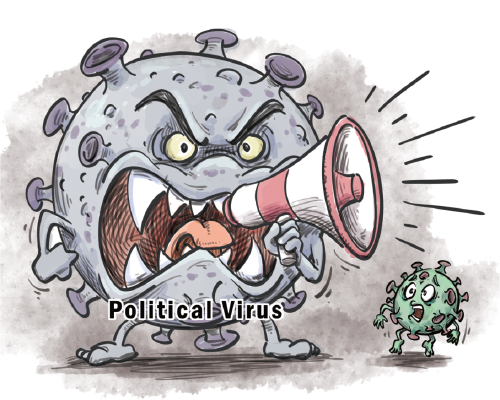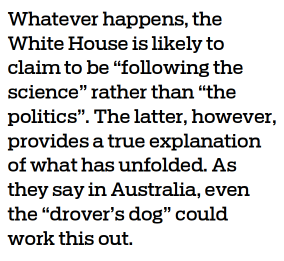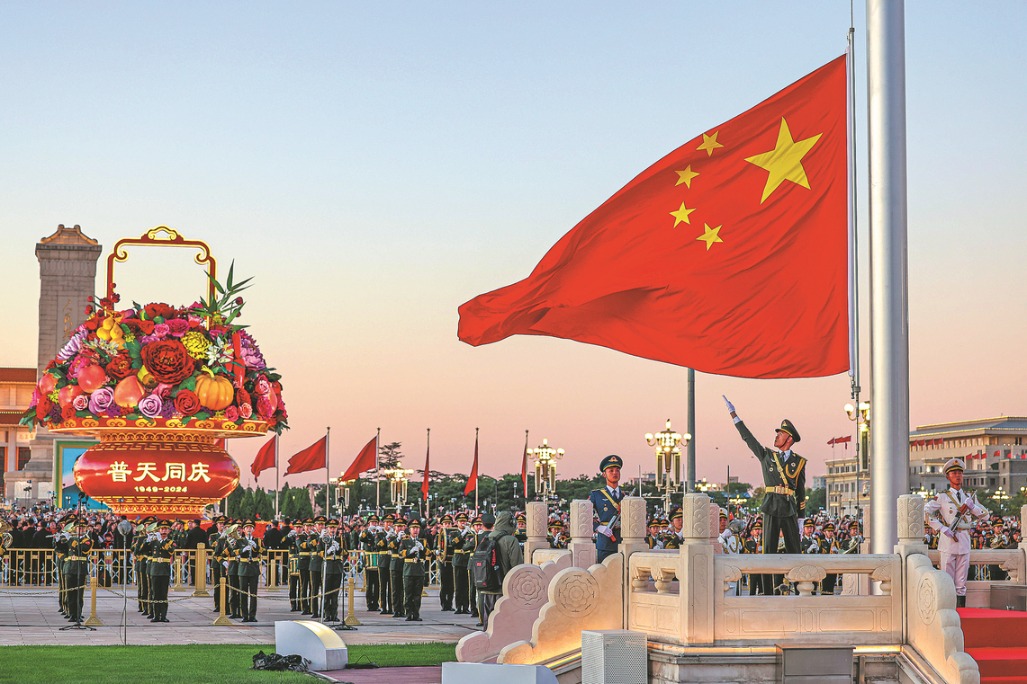US lab-leak probe seeks predestined result


In early 2020, then US president Donald Trump moved, within weeks, from saying that the COVID-19 pandemic was "very much under control in the USA" to blaming China in wild and race-based terms, as the pandemic raged, beyond control, across the United States.
The first COVID-19 case in the US and the Republic of Korea was confirmed on almost the same day, in late January 2020. Both countries had the benefit of over-two-weeks early warning, from China, on how dangerous the novel coronavirus was. But by mid-April 2020, on per capita basis, the US had an infection rate almost nine times higher than the ROK and a death rate over 17 times higher.
Trump and those around him soon began pushing the notion of a "lab leak" from the Wuhan Institute of Virology as the source of the initial COVID-19 outbreak. This claim was driven by a search for anything to deflect attention from their pivotal responsibility for the massive, deadly disaster unfolding across the US.
Most dramatically, Steve Bannon, a former Trump adviser, teamed up with Yan Li-Meng, a vocal young researcher from Hong Kong University, and the Murdoch global media network-and others-to advance the lab-leak theory in a highly vivid manner. Yan relocated from the Hong Kong Special Administrative Region to the US in April 2020, in some secrecy. She was then coached, including by Bannon, for her US media appearances, which started around July 2020.
In late November 2020, The New York Times published a long report investigating this saga, titled "How Steve Bannon and Chinese billionaire created a right wing coronavirus media sensation". The three journalists who compiled the report wrote:"An overwhelming body of evidence shows that the virus almost certainly originated in an animal, most likely a bat."
The report also confirmed that the US intelligence agencies said they could find no cogent evidence of any lab leak source. The lab-leak claims by the Trump administration were derided not just by the NYT but by a majority of the media in the US.
Despite these emphatic rebuttals of the lab-leak theory, many stories began circulating across the US liberal-leaning media, including the NYT, advocating a need to revisit this lab-leak narrative.
An article in the British Medical Journal in April this year observed that these principal media outlets had done a complete "U turn" on the issue, saying the primary reason for this change of view was that Trump had become ex-president Trump, losing the presidential election to Joe Biden.
Also, the BMJ claimed that "deep concerns" arising from the World Health Organization's novel coronavirus field research in China also played a role in this crucial change in viewpoint.
Let us consider the second point first and investigate what the paramount "deep concern" may have been. Colin Mackerras, an eminent Australian Sinologist, writing in June this year, observed that Australian Prime Minister Scott Morrison was "throwing his weight behind yet another independent investigation into the origins of the virus (because) the first one did not bring in the result he wanted, which was to put the blame on China". Mackerras also said: "It seems some country leaders, especially Biden but including Morrison, are determined to think the worst of China."
The new, US-led lab leak theorizing has been enveloped in discussions on an alleged absence of sufficient thoroughness and transparency in the WHO investigation. Closer examination, however, shows the core "deep concern" with the WHO investigation is that it did not produce the China-blaming outcome that Canberra, and Washington, wanted.
The first BMJ argument, that Trump's election loss was of critical importance, is plainly cogent. But the BMJ has not properly investigated the changed political landscape following Trump's defeat. Although the Biden administration has worked assiduously to rectify the worst of the dreadful COVID-19 legacy of Trump, the pandemic has continued to rage in the US, not least due to entrenched vaccine rejection or hesitancy. Which remains a real concern.
Moreover, experts are studying the possible outcome of the 2022 mid-term elections in the US. And the political changes in the US' profoundly polarized electorate show that Biden's Democratic Party faces a manifest risk of losing its slim control of the House of Representatives or the Senate or both.
The powerful anti-Trump media alliance realizes that it is time to get four-square behind Biden. As a result, for media supporters of the Biden administration, the lab-leak narrative that had once been dismissed as a fevered blame-averting exercise by the Trump administration is now more than worth "revisiting". Re-energizing the lab-leak conspiracy theory provides an opportune, Sino-phobic argument, blessed with significant potential to spur Democrat voter turnout and support in 2022.
The White House has not been watching this political project develop passively. In May this year, Biden ordered the US intelligence community to investigate (again) the source of the virus and file a report in 90 days.
There is an alarming reminder here of the notorious White House-driven investigation into the claim that former Iraqi leader Saddam Hussein possessed weapons of mass destruction (WMD), which led to what became a disastrous invasion of Iraq in 2003. Intelligence was shaped to show the likelihood of WMDs existing in Iraq, in order to justify a war the White House wanted.
As the NYT noted in a recent report, nearly all the US intelligence related to the Iraq invasion presented to the world in a UN speech, in February 2003, by the then US secretary of state Colin Powell "turned out to be false". Powell resigned from the Bush administration in late 2004.
If the virus origin tracing investigation by the US intelligence agencies deliver the hoped for result, endorsing the lab-leak theory, we can expect it to be put to swift political use. Even if it reports that there is no cogent evidence to support the theory, it can be blamed on the lack of China's transparency and still be put to work.
Whatever happens, the White House is likely to claim to be "following the science" rather than "the politics". The latter, however, provides a true explanation of what has unfolded. As they say in Australia, even the "drover's dog" could work this out.

The views don't necessarily reflect those of China Daily.
The author is a visiting professor in the Law Faculty of Hong Kong University.
If you have a specific expertise, or would like to share your thought about our stories, then send us your writings at opinion@chinadaily.com.cn, and comment@chinadaily.com.cn.
































